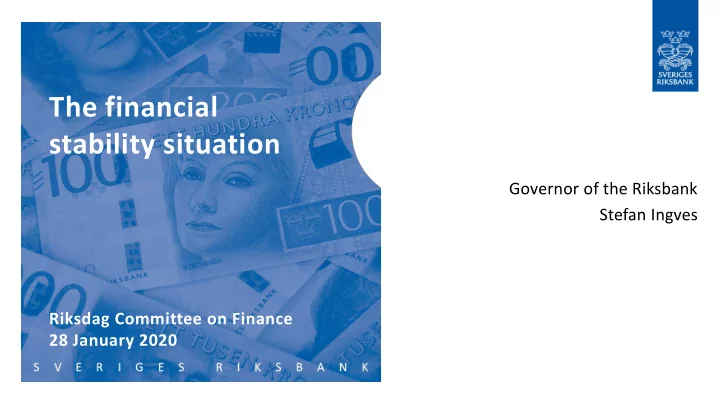

The financial stability situation Governor of the Riksbank Stefan Ingves Riksdag Committee on Finance 28 January 2020
Expectations of low interest rates for a long time may lead to challenges for financial stability Low government bond yields • Risk-taking may increase • Assets may become overvalued • Indebtedness may rise unsustainably Per cent. Yields on 10-year government bonds. Sources: The national central banks and the Riksbank
Household indebtedness – the largest domestic risk Debt is still high... … but growing at a slightly slower pace Total household debt as a share of disposable household income summed Debt growth, annual percentage change. Refers to loans from monetary over the past four quarters. The dashed line represents the Riksbank’s financial institutions (MFIs). forecast. Sources: Statistics Sweden and the Riksbank
Problems on the housing market need to be managed • Housing prices have stabilised, but uncertainty remains • Housing market functioning poorly • Important that tax and housing policy manage the problems – sporadic measures not enough Housing prices in Sweden, index 2005=100. Housing prices are seasonally- adjusted. Sources: Valueguard and the Riksbank
There are vulnerabilities in the banking system • Large banking system, high degree of interconnectedness • Swedish banks have substantial exposure to housing and commercial 76% property • Dependence on wholesale funding The chart refers to the percentage share of lending from Monetary Financial Institutions to households and companies that is against collateral in property. Source: Statistics Sweden
FinTech and cyber threats – How is financial stability Governor of the Riksbank affected? Stefan Ingves Riksdag Committee on Finance 28 January 2020
Financial services under constant technological development • Technological development in the financial sector is nothing new • Change is occurring gradually • Securities have been digital for a long time
Different players investing in FinTech • Agile, innovative financial companies • Established financial companies starting to use new technical innovations • BigTech companies expanding into financial services
Potential risks of FinTech • Security improvements not keeping up with technological developments • New and old technology must work together • New players can proliferate very quickly
Structural changes affect financial companies... • Digitalisation and globalisation • Financial infrastructure undergoing technological shift • Constantly increasing interconnectedness and complexity
… this involves rising operational risks for financial companies • Very difficult to gain an overview of all interdependencies • Contagion risks • Concentration risks • Cyber risks
Cyber risks present new challenges • Cyber attacks will succeed • The cyber threat is both cross- sectoral and cross-border • A cyber attack can constitute a systemic risk
Cyber risks in focus for the Riksbank • Strengthened preparedness • The Riksbank is improving resilience to cyber risks • National and international cooperation
Resilience in the Swedish financial system • Cyber risks of greater significance in the financial stability analysis • Important for the financial sector to achieve a fundamental level of resilience Source: Analysis of Central Clearing Interdependencies, August 2018. BIS, CPMI, FSB and IOSCO.
The Riksbank is coordinating TIBER-SE 1 • Testing resilience in a standardised manner • The Riksbank has a driving and coordinating role • Tested entities are hiring external suppliers to perform the actual tests 1. TIBER is short for Threat-Intelligence-based Ethical Red Teaming.
Recommend
More recommend